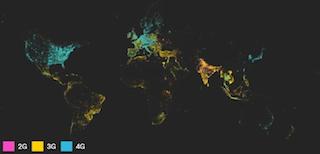See the following -
Testing A $35 Firefox OS Phone—How Bad Could It Be?
...While you're sitting there using your Internet-enabled device to read about some other Internet-enabled device, it's easy to forget that the majority of people doesn't have any access to the Internet at all. The "World Wide" Web is actually not that worldwide—only about one-third of the population is online...
- Login to post comments
The 'Internet of Things' Is Sending Us Back to the Middle Ages
 Internet-enabled devices are so common, and so vulnerable, that hackers recently broke into a casino through its fish tank. The tank had internet-connected sensors measuring its temperature and cleanliness. The hackers got into the fish tank’s sensors and then to the computer used to control them, and from there to other parts of the casino’s network. The intruders were able to copy 10 gigabytes of data to somewhere in Finland. By gazing into this fish tank, we can see the problem with “internet of things” devices: We don’t really control them. And it’s not always clear who does – though often software designers and advertisers are involved...
Internet-enabled devices are so common, and so vulnerable, that hackers recently broke into a casino through its fish tank. The tank had internet-connected sensors measuring its temperature and cleanliness. The hackers got into the fish tank’s sensors and then to the computer used to control them, and from there to other parts of the casino’s network. The intruders were able to copy 10 gigabytes of data to somewhere in Finland. By gazing into this fish tank, we can see the problem with “internet of things” devices: We don’t really control them. And it’s not always clear who does – though often software designers and advertisers are involved...
- Login to post comments
The Age of Hacking Brings a Return to the Physical Key
 With all the news about Yahoo accounts being hacked and other breaches of digital security, it’s easy to wonder if there’s any real way to keep unauthorized users out of our email and social media accounts. Everyone knows not to use the same username and password combination for every account – though many people still do. But if they follow that advice, people end up with another problem: way too many passwords to remember – 27 on average, according to a recent survey. That can lead to stress about password security, and even cause people to give up secure passwords altogether. It’s an ominous feeling, and a dangerous situation...
With all the news about Yahoo accounts being hacked and other breaches of digital security, it’s easy to wonder if there’s any real way to keep unauthorized users out of our email and social media accounts. Everyone knows not to use the same username and password combination for every account – though many people still do. But if they follow that advice, people end up with another problem: way too many passwords to remember – 27 on average, according to a recent survey. That can lead to stress about password security, and even cause people to give up secure passwords altogether. It’s an ominous feeling, and a dangerous situation...
- Login to post comments
The Blockchain Is the New Google
 At its core, the blockchain is a technology that permanently records transactions in a way that cannot be later erased but can only be sequentially updated, in essence keeping a never-ending historical trail. This seemingly simple functional description has gargantuan implications. It is making us rethink the old ways of creating transactions, storing data, and moving assets, and that’s only the beginning. The blockchain cannot be described just as a revolution. It is a tsunami-like phenomenon, slowly advancing and gradually enveloping everything along its way by the force of its progression. Plainly, it is the second significant overlay on top of the Internet, just as the Web was that first layer back in 1990. That new layer is mostly about trust, so we could call it the trust layer.
At its core, the blockchain is a technology that permanently records transactions in a way that cannot be later erased but can only be sequentially updated, in essence keeping a never-ending historical trail. This seemingly simple functional description has gargantuan implications. It is making us rethink the old ways of creating transactions, storing data, and moving assets, and that’s only the beginning. The blockchain cannot be described just as a revolution. It is a tsunami-like phenomenon, slowly advancing and gradually enveloping everything along its way by the force of its progression. Plainly, it is the second significant overlay on top of the Internet, just as the Web was that first layer back in 1990. That new layer is mostly about trust, so we could call it the trust layer.
- Login to post comments
The Brutal Bust In Next-Generation Biofuels In One Chart
The U.S. government finally faces the fact that we won't be powering our cars with corncobs any time soon.
- Login to post comments
The Charitable Face of Data Use
When a massive earthquake hit Haiti in January 2010, the United Nations found that data collected through mobile telephones was crucial to delivering its relief programmes in the region. The UN Foundation’s vice president of communications Aaron Sherinian explains that - as demonstrated in Haiti - processing complex data sets is now vital for non-profit organisations to help everything fro Read More »
- Login to post comments
The Day We Fought Back
[...] The groups that organized this action have long been pushing hard for real surveillance reform. But we knew that the time was ripe—that the Snowden leaks, unrelenting media pressure, grassroots activism, and even pressure from within Congress—were creating a once-in-a-lifetime opportunity to give the public—worldwide—the chance to voice its opposition to mass spying. [...] Read More »
- Login to post comments
The Edge of Wearables: When Will Society Take the Ultimate Leap?
 New wearable technology will soon have the capacity to become skin-deep, but society might not be ready to adopt it just yet. If your socks told your feet how to run faster, would you wear them? If a camera embedded in your scarf filmed your daily interactions, would you wear it? Do you use even half the functions your smartwatch offers? “People will wear clothing and accessories that reflect their individual style, and if the embedded technology delivers a tangible benefit, they will embrace it,” said Sandra Lopez, director of strategic alliances for Intel’s New Devices Group...
New wearable technology will soon have the capacity to become skin-deep, but society might not be ready to adopt it just yet. If your socks told your feet how to run faster, would you wear them? If a camera embedded in your scarf filmed your daily interactions, would you wear it? Do you use even half the functions your smartwatch offers? “People will wear clothing and accessories that reflect their individual style, and if the embedded technology delivers a tangible benefit, they will embrace it,” said Sandra Lopez, director of strategic alliances for Intel’s New Devices Group...
- Login to post comments
The Four Big Reasons Why 4 Billion People Aren't Online
 It's around 46 years since consumers first started to use online services, and 23 years since the NCSA Mosaic browser started to popularise the World-Wide Web. But more than half the world's population - around 4.1 billion people - are still not using the Internet, according to Facebook's 56-page State of Connectivity 2015 report. The authors note that "Over the past 10 years, connectivity increased by approximately 200 to 300 million people per year."...
It's around 46 years since consumers first started to use online services, and 23 years since the NCSA Mosaic browser started to popularise the World-Wide Web. But more than half the world's population - around 4.1 billion people - are still not using the Internet, according to Facebook's 56-page State of Connectivity 2015 report. The authors note that "Over the past 10 years, connectivity increased by approximately 200 to 300 million people per year."...
- Login to post comments
The Future According To Megan Smith
Women 2.0 conference keynote speaker and Google[x] VP Megan Smith gives us a glimpse of her 2020 vision — and it’s pretty inspiring. Read More »
- Login to post comments
The Golden Age Of Open Source Has Arrived
In the new economy, it’s not the code that matters — it’s how you use it to connect people to things they need. From 3D printers to Docker, open-source-based innovation is fueling some of the hottest digital capabilities of our time. Finally — the golden of source arrived. Companies 20 years ago built monopolies on licensed software; today, free and –source code fertilizes economic growth. The way to win at tech is no longer to own code, but to serve customers — and service source at its roots...
- Login to post comments
The Google File System Makes NSA’s Hack Blatantly Illegal And They Know It
The latest Edward Snowden bombshell that the National Security Agency has been hacking foreign Google and Yahoo data centers is particularly disturbing. Plenty has been written about it so I normally wouldn’t comment except that the general press has, I think, too shallow an understanding of the technology involved. The hack is even more insidious than they know. Read More »
- Login to post comments
The Growing Rivalry Between Google and IBM
 Still the growing rivalry is unmistakeable. Very few companies are capable of developing this type of deep learning technology and clearly, both IBM and Google are leading the pack. To be sure, other companies such as Facebook and Microsoft are also developing capabilities in this area, but up to this point at least, they don’t seem to have made quite as much progress.
Still the growing rivalry is unmistakeable. Very few companies are capable of developing this type of deep learning technology and clearly, both IBM and Google are leading the pack. To be sure, other companies such as Facebook and Microsoft are also developing capabilities in this area, but up to this point at least, they don’t seem to have made quite as much progress.
- Login to post comments
The Insight Journal 3.0
Kitware’s data publishing team is pleased to announce the release of a new major version the Insight Journal. The Insight Journal is an open access journal covering scientific domains from visualization to image computing. Since its launch in 2006, the Insight Journal (IJ) has become a central resource for scientific developers around the world. Read More »
- Login to post comments
The Man Who Would Build A Computer The Size Of The Entire Internet
[...] Inside the massive data centers that drive things like Google Search and Gmail and Google Maps, you’ll find tens of thousands of machines — each small enough to hold in your arms — but thanks to a new breed of software that spans this sea of servers, the entire data center operates like a single system, one giant computer that runs any application the company throws at it. Read More »
- Login to post comments